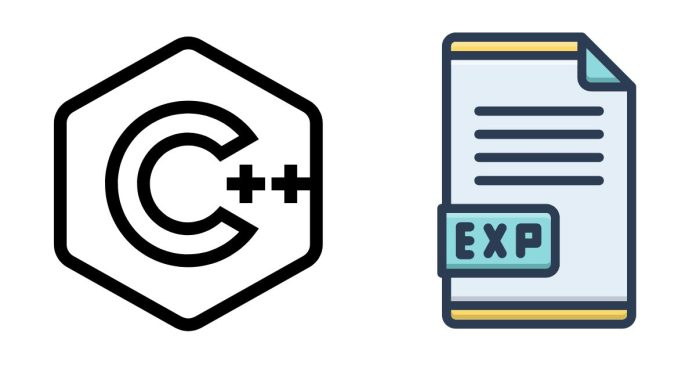In C++, an .exp file is a module definition or export file that is generated when creating a dynamic-link library (DLL) or an executable file in some development environments, like Microsoft Visual Studio.
What is an .exp File?
The .exp file is an exports file that lists all the functions, variables, or symbols that are exported (made available) by a DLL or executable. It is generated during the linking phase when you build your project.
Key Use Cases of .exp Files
- Linking Against a DLL
- When a DLL exports functions or symbols, an
.expfile helps the linker know which symbols are available to be imported by other applications or libraries. - This is particularly useful when you do not have a static import library (
.lib) to provide this information.
- When a DLL exports functions or symbols, an
- Custom Export Definitions
- If you use a module definition file (
.def) to explicitly define which symbols to export, the.expfile is generated based on that.deffile.
- If you use a module definition file (
- Intermediate File for Linkers
- The
.expfile serves as an intermediate file for the linker to process exported symbols. In some cases, it is used internally and may not need to be directly handled by the developer.
- The
When is an .exp File Created?
An .exp file is typically created in the following scenarios:
- You build a DLL project in Visual Studio.
- You build an executable file that exports symbols (rare, but possible with custom setups).
- You use a
.deffile with your project to specify exports explicitly.
Relationship Between .exp and .lib
- When you build a DLL, the linker typically creates:
.lib: The import library for the DLL. Other projects use this library to link against the DLL..exp: A file listing exported symbols, often generated alongside the.libfile.
Contents of an .exp File
The .exp file contains:
- A list of symbols (functions, variables, etc.) that are exported by the DLL or executable.
- Memory addresses and ordinal numbers (in some cases) for these exports.
It is not meant to be human-readable but is used internally by the linker.
Do You Need the .exp File?
- Typically No: In most projects, you don’t need to worry about the
.expfile. The linker and compiler manage it automatically. - When You Might Need It:
- If you are debugging linking issues.
- If you are working with custom or advanced build configurations.
- If your project uses a
.deffile explicitly for exports.
Example with a .def File
Here’s an example where an .exp file might be generated.
Module Definition File (example.def)
EXPORTS
MyFunction1
MyFunction2
Building the DLL
When you compile this project:
- The
.expfile is generated based on the.deffile. - The
.expfile lists the exported symbols (MyFunction1,MyFunction2).
Conclusion
- An
.expfile is an intermediate file used by the linker to manage exported symbols in a DLL or executable. - It is automatically generated during the build process.
- Unless you’re troubleshooting or using advanced configurations, you generally don’t need to interact with it directly.
Let me know if you need further clarification!


